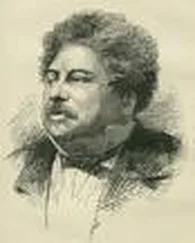Alexandre Dumas - Louise de la Valliere
Здесь есть возможность читать онлайн «Alexandre Dumas - Louise de la Valliere» — ознакомительный отрывок электронной книги совершенно бесплатно, а после прочтения отрывка купить полную версию. В некоторых случаях можно слушать аудио, скачать через торрент в формате fb2 и присутствует краткое содержание. Жанр: literature_19, foreign_antique, foreign_prose, на английском языке. Описание произведения, (предисловие) а так же отзывы посетителей доступны на портале библиотеки ЛибКат.
- Название:Louise de la Valliere
- Автор:
- Жанр:
- Год:неизвестен
- ISBN:нет данных
- Рейтинг книги:5 / 5. Голосов: 1
-
Избранное:Добавить в избранное
- Отзывы:
-
Ваша оценка:
- 100
- 1
- 2
- 3
- 4
- 5
Louise de la Valliere: краткое содержание, описание и аннотация
Предлагаем к чтению аннотацию, описание, краткое содержание или предисловие (зависит от того, что написал сам автор книги «Louise de la Valliere»). Если вы не нашли необходимую информацию о книге — напишите в комментариях, мы постараемся отыскать её.
Louise de la Valliere — читать онлайн ознакомительный отрывок
Ниже представлен текст книги, разбитый по страницам. Система сохранения места последней прочитанной страницы, позволяет с удобством читать онлайн бесплатно книгу «Louise de la Valliere», без необходимости каждый раз заново искать на чём Вы остановились. Поставьте закладку, и сможете в любой момент перейти на страницу, на которой закончили чтение.
Интервал:
Закладка:
Louis was overcome by it. “In that case,” he said to Fouquet, who anxiously awaited the result of this proof, “the cardinal’s hat is promised. Monsieur d’Herblay, I pledge you my honor that the first promotion shall be yours. Thank M. Fouquet for it.” Colbert overheard these words; they stung him to the quick, and he left the salon abruptly. “And you, Monsieur du Vallon,” said the king, “what have you to ask? I am truly pleased to have it in my power to acknowledge the services of those who were faithful to my father.”
“Sire – ” began Porthos, but he was unable to proceed with what he was going to say.
“Sire,” exclaimed D’Artagnan, “this worthy gentleman is utterly overpowered by your majesty’s presence, he who so valiantly sustained the looks and the fire of a thousand foes. But, knowing what his thoughts are, I – who am more accustomed to gaze upon the sun – can translate them: he needs nothing, absolutely nothing; his sole desire is to have the happiness of gazing upon your majesty for a quarter of an hour.”
“You shall sup with me this evening,” said the king, saluting Porthos with a gracious smile.
Porthos became crimson from delight and pride. The king dismissed him, and D’Artagnan pushed him into the adjoining apartment, after he had embraced him warmly.
“Sit next to me at table,” said Porthos in his ear.
“Yes, my friend.”
“Aramis is annoyed with me, I think.”
“Aramis has never liked you so much as he does now. Fancy, it was I who was the means of his getting the cardinal’s hat.”
“Of course,” said Porthos. “By the by, does the king like his guests to eat much at his table?”
“It is a compliment to himself if you do,” said D’Artagnan, “for he himself possesses a royal appetite.”
Chapter IX. Explanations
Aramis cleverly managed to effect a diversion for the purpose of finding D’Artagnan and Porthos. He came up to the latter, behind one of the columns, and, as he pressed his hand, said, “So you have escaped from my prison?”
“Do not scold him,” said D’Artagnan; “it was I, dear Aramis, who set him free.”
“Ah! my friend,” replied Aramis, looking at Porthos, “could you not have waited with a little more patience?”
D’Artagnan came to the assistance of Porthos, who already began to breathe hard, in sore perplexity.
“You see, you members of the Church are great politicians; we mere soldiers come at once to the point. The facts are these: I went to pay Baisemeaux a visit – ”
Aramis pricked up his ears at this announcement.
“Stay!” said Porthos; “you make me remember that I have a letter from Baisemeaux for you, Aramis.” And Porthos held out the bishop the letter we have already seen. Aramis begged to be allowed to read it, and read it without D’Artagnan feeling in the slightest degree embarrassed by the circumstance that he was so well acquainted with the contents of it. Besides, Aramis’s face was so impenetrable, that D’Artagnan could not but admire him more than ever; after he had read it, he put the letter into his pocket with the calmest possible air.
“You were saying, captain?” he observed.
“I was saying,” continued the musketeer, “that I had gone to pay Baisemeaux a visit on his majesty’s service.”
“On his majesty’s service?” said Aramis.
“Yes,” said D’Artagnan, “and, naturally enough, we talked about you and our friends. I must say that Baisemeaux received me coldly; so I soon took my leave of him. As I was returning, a soldier accosted me, and said (no doubt as he recognized me, notwithstanding I was in private clothes), ‘Captain, will you be good enough to read me the name written on this envelope?’ and I read, ‘To Monsieur du Vallon, at M. Fouquet’s house, Saint-Mande.’ The deuce, I said to myself, Porthos has not returned, then, as I fancied, to Bell-Isle, or to Pierrefonds, but is at M. Fouquet’s house, at Saint-Mande; and as M. Fouquet is not at Saint-Mande, Porthos must be quite alone, or, at all events, with Aramis; I will go and see Porthos, and I accordingly went to see Porthos.”
“Very good,” said Aramis, thoughtfully.
“You never told me that,” said Porthos.
“I had no time, my friend.”
“And you brought back Porthos with you to Fontainebleau?”
“Yes, to Planchet’s house.”
“Does Planchet live at Fontainebleau?” inquired Aramis.
“Yes, near the cemetery,” said Porthos, thoughtlessly.
“What do you mean by ‘near the cemetery?’” said Aramis, suspiciously.
“Come,” thought the musketeer, “since there is to be a squabble, let us take advantage of it.”
“Yes, the cemetery,” said Porthos. “Planchet is a very excellent fellow, who makes very excellent preserves; but his house has windows which look out upon the cemetery. And a confoundedly melancholy prospect it is! So this morning – ”
“This morning?” said Aramis, more and more excited.
D’Artagnan turned his back to them, and walked to the window, where he began to play a march upon one of the panes of glass.
“Yes, this morning we saw a man buried there.”
“Ah!”
“Very depressing, was it not? I should never be able to live in a house where burials can always be seen from the window. D’Artagnan, on the contrary, seems to like it very much.”
“So D’Artagnan saw it as well?”
“Not simply saw it; he literally never took his eyes off the whole time.”
Aramis started, and turned to look at the musketeer, but the latter was engaged in earnest conversation with Saint-Aignan. Aramis continued to question Porthos, and when he had squeezed all the juice out of this enormous lemon, he threw the peel aside. He turned towards his friend D’Artagnan, and clapping him on the shoulder, when Saint-Aignan had left him, the king’s supper having been announced, said, “D’Artagnan.”
“Yes, my dear fellow,” he replied.
“We do not sup with his majesty, I believe?”
“Well? — we do.”
“Can you give me ten minutes’ conversation?”
“Twenty, if you like. His majesty will take quite that time to get properly seated at table.”
“Where shall we talk, then?”
“Here, upon these seats if you like; the king has left, we can sit down, and the apartment is empty.”
“Let us sit down, then.”
They sat down, and Aramis took one of D’Artagnan’s hands in his.
“Tell me, candidly, my dear friend, whether you have not counseled Porthos to distrust me a little?”
“I admit, I have, but not as you understand it. I saw that Porthos was bored to death, and I wished, by presenting him to the king, to do for him, and for you, what you would never do for yourselves.”
“What is that?”
“Speak in your own praise.”
“And you have done it most nobly; I thank you.”
“And I brought the cardinal’s hat a little nearer, just as it seemed to be retreating from you.”
“Ah! I admit that,” said Aramis, with a singular smile, “you are, indeed, not to be matched for making your friends’ fortunes for them.”
“You see, then, that I only acted with the view of making Porthos’s fortune for him.”
“I meant to have done that myself; but your arm reaches farther than ours.”
It was now D’Artagnan’s turn to smile.
“Come,” said Aramis, “we ought to deal truthfully with each other. Do you still love me, D’Artagnan?”
“The same as I used to do,” replied D’Artagnan, without compromising himself too much by this reply.
“In that case, thanks; and now, for the most perfect frankness,” said Aramis; “you visited Belle-Isle on behalf of the king?”
Читать дальшеИнтервал:
Закладка:
Похожие книги на «Louise de la Valliere»
Представляем Вашему вниманию похожие книги на «Louise de la Valliere» списком для выбора. Мы отобрали схожую по названию и смыслу литературу в надежде предоставить читателям больше вариантов отыскать новые, интересные, ещё непрочитанные произведения.
Обсуждение, отзывы о книге «Louise de la Valliere» и просто собственные мнения читателей. Оставьте ваши комментарии, напишите, что Вы думаете о произведении, его смысле или главных героях. Укажите что конкретно понравилось, а что нет, и почему Вы так считаете.












